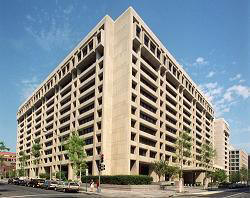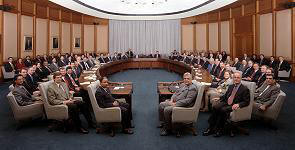|
Limba romana 
63 years ago, on July 22, 1944, the IMF Articles of Agreement were formulated at
the International Monetary and Financial Conference in Bretton Woods
During July 1-22, 1944, 730 delegates from 45 countries met at the Mount
Washington Hotel in Bretton Woods (New Hampshire, USA) to discuss the postwar
recovery of Europe as well as a number of monetary issues, such as unstable
exchange rates and protectionist trade policies.
The delegates at Bretton Woods reached an agreement known as the Bretton
Woods Agreement to establish a postwar international monetary system of
convertible currencies, fixed exchange rates and free trade. To facilitate these
objectives, the agreement created two international institutions: the
International Monetary Fund (IMF) and the International Bank for Reconstruction
and Development (the World Bank).

Article I of the
Articles of Agreement sets out the IMF's main
responsibilities:
- promoting international monetary cooperation;
- facilitating the expansion and balanced growth of
international trade;
- promoting exchange stability;
- assisting in the establishment of a multilateral system
of payments; and
- making its resources available (under adequate
safeguards) to members experiencing balance of payments
difficulties.
|
Fast Facts on the IMF:
- Current membership: 185 countries
- Staff: approximately 2,716 from 165
countries
- Total Quotas: $317 billion (as of 7/31/06)
- Loans outstanding: $28 billion to 74
countries, of which $6 billion to 56 on
concessional terms (as of 7/31/06)
- Technical Assistance provided: 429.2 person
years during FY2006
- Surveillance consultations concluded: 128
countries during FY2006, of which 122
voluntarily published information on their
consultation.
|
 |
|
|
IMF activities
More generally, the IMF is responsible for ensuring the stability
of the international monetary and financial system—the system of
international payments and exchange rates among national currencies
that enables trade to take place between countries.

The Fund seeks to promote economic stability and prevent crises;
to help resolve crises when they do occur; and to promote growth and
alleviate poverty. It employs three main functions—surveillance,
technical assistance, and lending—to meet these objectives. |
Moldova joined the IMF on August 12, 1992, right after it received full
membership status with the UNO. Moldova’s quota in the IMF amounts to
SDR 123.2 million
(about US$183 million) or 0.06 percent of total quota. Moldova’s voting power in
the IMF is 1,482 votes or 0.07 percent of total.
Moldova’s Governor in the IMF is the Hon. Leonid Talmaci, Governor, National
Bank of Moldova; its Alternate Governor is the Hon. Mihai Pop, Minister of
Finance.
Mr. Age Bakker (Dutch) is Moldova’s Executive Director in the IMF; his
constituency also includes Armenia, Bosnia and Herzegovina, Bulgaria, Croatia,
Cyprus, Georgia, Israel, the former Yugoslav Republic of Macedonia, Romania, and
Ukraine.
IMF's Resident Representative in Moldova is Mr. Johan Mathisen (Norvegian).
IMF Mission Chief for the Republic of Moldova is Mr. Graeme Justice (British).
 |
|
Age Bakker,
Director Executiv
al FMI pentru Moldova
|
|
 |
|
Johan Mathisen,
reprezentant permanent
al FMI inMoldova
|
|
 |
|
Graeme Justice,
şeful misiunii
FMI pentru Moldova
|
|
Since 1993, Moldova has had seven arrangements with the IMF in support of the
Government's economic adjustment programs. Total amount of loans granted by IMF
to Moldova totalled US$ 470m. Total Fund credit and loans outstanding at
end-June 2007 amounted to US$ 131 million.
Starting with May 5, 2006, the Republic of Moldova is benefiting from IMF's
financial assistance of about US$ 170 million, in the framework of the 3-year
Poverty Reduction and Economic Growth Facility (PRGF).
The IMF has provided Moldova with technical assistance in a number of areas,
including fiscal management, public expenditure, tax and customs, monetary
accounting system, bank supervision, monetary policy/central bank organization,
and in various statistical areas.
|






